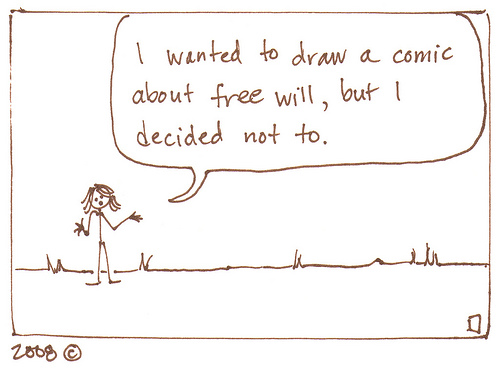 |
| This is my free will, you take care of yourself |
There are many attributes on which we define human moral and ethical behaviour, choices and its impact. I think free will is one attribute which has been considered really special. This is one attribute that that has been told to let humans make their own decisions. It is believed to be so pure that even Gods are not able to play with free will of a human. One can find its reference in books and few movies as well; one that I can recall at the moment is Bruce Almighty. There is of course ongoing debate on the definition of free will, but that is something beyond the scope of this writing. I will let the regular user to use her “free will” to decide. However, with time new thoughts keep appearing and modern, scientific human is challenging its existence.
Scientific way
Today human as a species is moving in the direction to deny old concepts of religion and trying to define new ways. Science is probably one of the major in this race. No wonder, science is used to challenge the concept of Free will as well. Why not, after all free-will was one of the major concept in old religions to define good vs bad person. It also helped to release Almighty God of “bad” things done by humans.
The experiment
One scientist, Mr Benjamin Libet, used science to track human brain activity to propose that free will is a notion. Libet’s experiment was revisited by many people and some even conclude that in some cases machine can tell 5 seconds in advance what the person is going to do, before he himself knows what he is going to do!! This way science is used to prove that what we think we have decided was already decided by unconscious brain. We just became aware of it and trying to take the credit of making a very special choice.
Impact
I believe, I do not know really need to mention this part, but still is good to set some perspective.
- Imagine you are watching a tennis match between Djokovic and Nadal. (Well some may prefer Federer but that does not matter for now). Also imagine, you have a machine that is reading their unconscious signals. When the serve comes at speed of 130 mph, there is only about 500ms to react. If this science machine works, would you really enjoy that full top spin forehand from Nadal leaving the court after bouncing right at the corner?
- Imagine a buzzer quiz. You probably already decided on the answer even before the question is finished.
Personal View
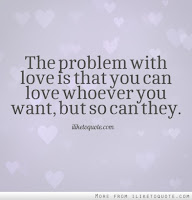
I am neither a neuroscientist nor a philosopher. But, this experiment is strange to conclude such a general topic.
- In this case, test subject is conditioned to do something. Sure, her brain is working upfront. Could it not be those signals being detected earlier?
- How much time does it need to make a decision when we suddenly see a full speed car about to hit us and a child?
- Brain’s basic speed is slow compare to computers. How do we detect the gap between when I think I am conscious and when I was actually conscious and finally when I was able to see that pointer to mark this awareness?
- How does it relate to free-will? It is an action taken with difference of conscious or unconscious brain activity ( as believed to be). Free-will is only a definition, which is subjective.
Logical way
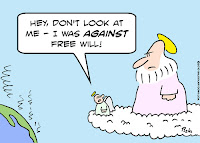 |
| it.toonpool.com |
There are many other people who are arguing, debating about the notion of free will. It is nothing new, but I believe that connectedness made possible by technology makes it easier to start a forest fire. One of the popular name in recent times to talk about this notion is Sam Harris. He is philosopher, neuroscientist and a big time author and speaker. One of his lectures at “Festival of Dangerous Ideas” is about convincing people that free will is a notion. It is a good lecture and it should not be a surprise considering his credentials.
The Argument
One can always listen to the full lecture on the link or read a book or just search online. The way “randomness and determinism” made me pick the highlights of the argument are below.
- Free will is not mappable to any conceivable reality it does not matter if science has advanced enough or not.
- If a crocodile eats our hand then we just accept it, but if a human attacks and cut our arm then we bring morality in the picture by asking questions like he had a choice, a free-will not to do it. But, he did it. So he needs to be punished. Why do we behave different?
- Free will is based on 2 false assumptions.
- We could have made a difference choice; I could have been a doctor and not engineer or I could have bought a house than an apartment. But it is only looking back. It does not mean that I could have with my free will. I did the only possible thing that I could.
- We are a conscious source who is making the active decision. I decide first and then do it. Do we really do it?
- Conscious will is either one of the below and hence free will does not make any sense
- a long chain of causes in the past that one is not responsible for (comes from determinism)
- or randomness and one is not responsible for that either.
- or a combination.
- If free will was something special e.g. related to soul or something, even then it makes no sense. Take an example of a murderer who had some brain damage. Why do we immediately stop judging this man and do not challenge his free will (soul)?
Impact
This talk is more about moral use of free will in religious and justice system. Most of the time examples cited are “negative or bad” ones to show how removing free will from the world will make it a better world. I am not so sure, if this will work.
In his mind, there is some definition of good and bad. But, do we even know what it means? Imagine billions of people, religious or not, who due to long chain of actions in their life are making choices based on their understanding of free-will. Now suddenly, one of their main base is gone! Our brain works in amazing ways that despite the scientific advancement, we do not fully understand. We even taste differently because a “soda beverage” is in some different colour bottle and somebody told us that they are different! Consider this and now imagine that we tell everyone that they are not responsible for their actions.
There are other studies done to see what happens when people start to believe that there is no free will. Few other people are discussing Free will with more open mind than trying to force one idea. Read or watch these discussions also to make “your choice”.
 Personal view
Personal view
It is not easy to argue with a philosopher alone. Consider when he is a neuroscientist too. One can be overwhelmed by credentials. Nevertheless, in my view this topic has been touched in a way to make sensation and create business. Same way, articles are written with titles e.g.”28 reasons why one should never visit India“. In some way it is simply arguing about use of language and how we believe and understand about certain words.
 |
| But it is still just a believe |
- “Free will is not mappable to any conceivable reality”. Hey, if it is not conceivable today, it does not mean it is the end of the world. Airplane or train was not conceivable at some time. To consider that earth is round or is not the centre of the universe or earth revolves around the sun were are all not conceivable.
- Talk starts with saying that he hope to convince people. If all is just randomness or long sequence of previous causes and effects, then this statement is just dumb. If one really believes in topic, he cannot make a statement like this. Statement may sound more like, “I do not know if anyone is going to believe me or not, as your choices are random or based on your previous history. I am just going to say what I have to because for some reason I made a choice to be here to talk to some random people, who I do not know personally”. Unless, he is gong to use conditioning to make people believe in his viewpoint, like a psychological experiment.
- There is an argument about soul vs you. “If I do not know what my soul is going to do next, then I am not in control of my soul. This means I still l do not have free will or at least I am not making choices”. Who is deciding that I am the controller of the soul? Before talking about soul, how do I define, who am I?
- It is also argued that if I am not the conscious decision maker then I do not take the credit for it. Imagine today, that using this notion, if all the credit is “really” taken away. That means no name, no money, no royalty on sold books, after all it was just a random event, right?
- There is a comment at the end in questions and answers section about faith. “faith can make people do unthinkable things”. Why is it only quoted in a negative way? It is also equally positive statement. In some way, faith can make a person do something amazing, that a logical person who denies free will cannot, why not?
- One of the strange thing for me is that it is in “festival of dangerous ideas”. But even here, it is sold only as a business. If it was really dangerous then it will accept the concept in totality. It won’t just say that free will is notion in a way in which we just change our perspective towards “bad” things, whatever they mean. But it will also allow a person to say to his partner/child openly that I love you and I have no clue why. Tomorrow if a randomness make me leave you, just move on with your life. All the feelings that you have in your mind against me are just cause and effect and so just drop it and think logically. If due to drop of free will one need to change how to judge a killer, one need to change how to perceive a lover as well. However, saying that is dangerous. On the contrary changing only “bad” and keeping the “good” same as it was, is hypocrisy. Compassion and love makes sense, but anger and punishment do not! It is like saying breeze makes sense, but a hurricane do not. In other way, it is like making a statement, ” Do you know speed of light is not constant. So trust me that Einstein’s assumption is wrong about light, but everything else remains the same!!”.
- Freedom to do what one wants is precious. What does it mean? Who is “wanting” what? If what I want is to kill, remember I do not know why and am not responsible, is it still precious?
- It also has a sarcastic comment about “fantasy life of ancestors in believing the myth of free-will”. However, he has no problem accepting fantasies/myths of human morals, justice system and states etc.
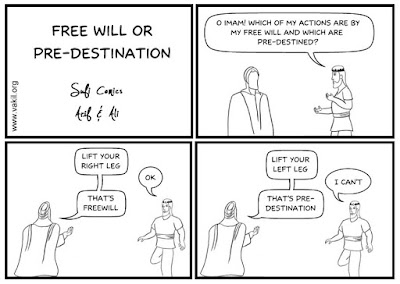 |
| Definition or just logical simplicity of free will |
I understand all the logical reasoning given here to get the attention to challenge free will. Nothing wrong in it. After all it is just what we think at the moment and what we happen to believe. If we are accepting that there is no free will, remember that even this is not our conscious choice, just a
random event. Next level of randomness or a cause may change it. We do not take crocodile to the court and try to judge him by its free will, but at least we are not aware of any other species that is talking about moralities, ethics and defining good vs bad.
Final comments
When a person make a statement that he happened to hit upon a beautiful thing, where “pride an shame do not make lot of sense”. I would like to see the person when some random guy comes attacks the family rape his wife/daughter/sister, torture them and sit in front of him with a smile. This person has a gun his hand and then I would like to see, if the reaction is to say, oh it is just some random neurons firing so lets have a long talk about past childhood traumas! At that moment, will any one stop to think about a chapter on free will?
Then there are times, when we do not know what to do, but we have to make a choice. We may not understand why we did it, but we believed in it. The same happens with mistakes also. However, if we do not understand it, is the only other end left is that I am not responsible for my choice? Probably to define such a state, people gave names like free will, intuition, soul and may be new name is randomness.
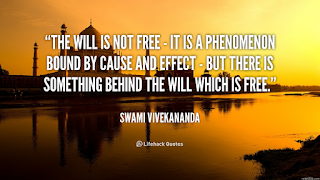 Imagine a fully automated car computer system. It might like to believe that it is in complete control of the system. But at some times, it receives some external signal, that makes it change its behaviour. It does not understand why, but it did make a change. That someone, probably people defined as soul who takes car of the free will. On the other side a driver is driving a car. This car is making a lot of decisions by itself for the driver. e.g. how much fuel should go in, how much valves should be opened or closed. Driver is not aware of any of these simple tasks, but he deciding on which direction to take or whether to avoid hitting somebody or not. Now, similar to a brain damage and killer, if car’s system breakdown and it makes the driver do an accident. Will we consider this case the same way when a car hits someone, but the car’s system was working properly?
Imagine a fully automated car computer system. It might like to believe that it is in complete control of the system. But at some times, it receives some external signal, that makes it change its behaviour. It does not understand why, but it did make a change. That someone, probably people defined as soul who takes car of the free will. On the other side a driver is driving a car. This car is making a lot of decisions by itself for the driver. e.g. how much fuel should go in, how much valves should be opened or closed. Driver is not aware of any of these simple tasks, but he deciding on which direction to take or whether to avoid hitting somebody or not. Now, similar to a brain damage and killer, if car’s system breakdown and it makes the driver do an accident. Will we consider this case the same way when a car hits someone, but the car’s system was working properly?
We are not responsible, but it matters to make decisions and take actions. Based on the same principles, people created the free will, gods and morality and punishment. So whats the fight? Why only either this or that? Hinduism have kept determinism, randomness and free will all together in the system. It is placed and used as when people feel deemed it fit for purpose.
At the end it is just a philosophical myth of mankind. Whatever story one wants, or should I say happens to believe, will stay. One that somehow finds a way through majority will live little longer. I am not sure what you think about this topic. It is after all a game played in the mind. In this case we are trying to make choices about mythological objects like free will, consciousness, morality etc, while after such a long lifespan of humans, we are still trying to make a choice on the right method to defecate! Based on your free will or randomness or determinism you will make a “choice”. Whether you are aware of it consciously or unconsciously, I hope you can find some time everyday for a smile.
Love
Arundeep
One evening, after considerable deliberation, as they sat down for dinner, Nasruddin told Fatima, “I have decided to become a vegetarian. I will forego fish, fowl, and meat out of respect for all sentient beings.”
Fatima said, “That’s too bad, because I made a wonderful fish stew for dinner tonight.”
“I’ll just have some of the broth from the soup, thank you.”
“Suit yourself.” As Fatima poured the soup from the pan, she took a spoon and tried to hold back the offending but delicious smelling chunks of fish that were falling into Nasruddin’s bowl.
Nasruddin held up his hand and said, “Fatima, please — don’t stop the fish, of their own informed consent and free will, from swimming into the bowl.”


